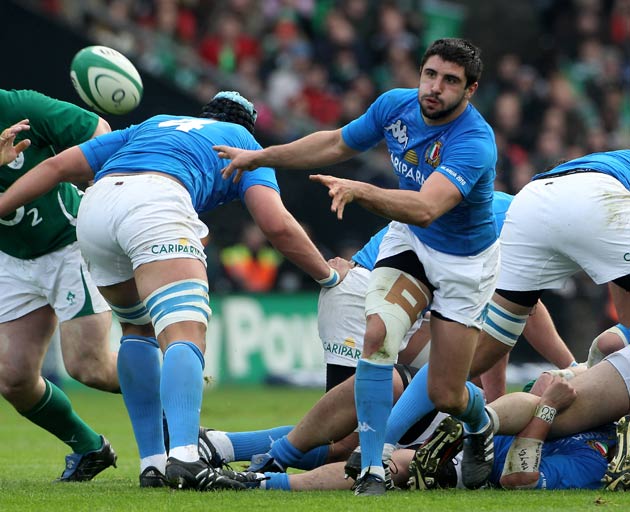Peter Bills: International referees losing focus

The problem with refereeing rugby matches in this modern era invites an analogy with manning the defences of the Low Countries as the Nazi war machine attacked on a wide front in 1940.
Pay attention to one aspect, and another crisis immediately arises somewhere else. Focus on one thing here and there's a problem over there. And so it goes on...
Romain Poite's refereeing of the Ireland v Italy game in Dublin at the weekend was a classic instance of this syndrome. It is all very well for the refereeing co-ordinator Paddy O'Brien to try and sharpen up officials' handling of key issues like the breakdown.
It has become the scourge of the game, a pile-up with myriad offences discernible. Which to penalise, which to ignore? As one leading referee told me last week “I could be blowing my whistle the whole game, handing out 40 or 50 penalties in a single match. The offences are being committed, they are there. Trouble is, if we all did that there wouldn't be any games to watch.”
That is true. But those in authority have to do better than Monsieur Poite at Croke Park. For sure, he focused on the breakdown and trying to ensure, as per the edict, that players tackling the ball carrier do NOT have the right to hold onto that player once he is caught. The All Blacks captain Richie McCaw is just one who has perfected this art to his and his team's advantage.
Such a tactic invariably means the ball is sealed off and the opposition denied rapidly recycled second phase possession, the oxygen required to keep a flow within the play. So the intent was fine.
Likewise, referees have been told to get tough with all the scrum collapses. Poite did that, too, although a penalty count of 3-2 suggests that he was refereeing more by rota than genuine conviction. If that were the case then you could sympathise: after all, who can ever finger precisely which of those wily operators is up to his devious tricks on a given occasion? And then there's the whole separate matter of the double bluff...
Where I lose patience with referees is when they forget about other crucial facets of the game because they're so busy focusing on a couple of new edicts. This was demonstrated with disturbing clarity in Dublin by Poite's complete failure to police the offside line. In this respect, you have to say, he alone is not deficient in that regard.
To be asked to believe, as Poite's non-refereeing of that phase suggested, that not a single player stepped over the offside line in the first hour of Saturday's match, is stretching credibility to breaking point, especially when less than five minutes studying the game through binoculars revealed enough offenders to fill a prison ship moored off London's Thames Estuary.
Now some referees might suggest this offence registers a considerable way down the list of offences worthy of stopping the game. Wrong, completely wrong.
By encroaching in front of the rear-most feet, the stipulation which is in the law book, players are strangling the game at birth. There is no space in the modern game, not just because of enormously enhanced fitness levels, but because players invariably receive both man and ball in the same instant. Not even a genius can play under those circumstances.
The law book stipulates a 5 metre gap must be adhered to. In most cases, as last Saturday in Dublin showed, it is more normally around a metre and a half. The whole Dublin game was a series of crunching collisions at close quarters and one of the reasons for that was, Poite completely ignored the consistent offside of both teams defending the gain line.
Such a failure is destroying the attacking part of the game. That doesn't matter if all spectators wish to see nowadays is a series of great behemoths hurling themselves at a wall of similarly built beasts. Personally, I'd watch American Football if that was my pleasure.
But unless referees police this aspect of the game far more strictly, that is what rugby union will become. Poite took 66 minutes to penalise an offside on the gain line, a ludicrously misplaced faith in players' honesty and judgement. At just about every single ruck, someone was offside and usually it was at least three or four defenders. Thus, we had no game.
That shrewd former Australian Wallaby captain Andrew Slack has insisted for years that the only way to free up any space in the game is by widening the 5 metre gap to 10 metres, thereby forcing defenders to get back and allow some space for the attacking side. For me, Slack is right.
If the law were changed to become 10 metres, the reality is it would be constricted to about 6 or 7 metres by most referees. But at present, the 5 metres is coming down to no more than a metre or two and that plainly isn't enough.
The alternative is for referees to enforce 5 metres with draconian zeal. But as Poite reminded us last weekend, that isn't likely to happen any time soon. Thus, another solution must be found.
Subscribe to Independent Premium to bookmark this article
Want to bookmark your favourite articles and stories to read or reference later? Start your Independent Premium subscription today.

Join our commenting forum
Join thought-provoking conversations, follow other Independent readers and see their replies